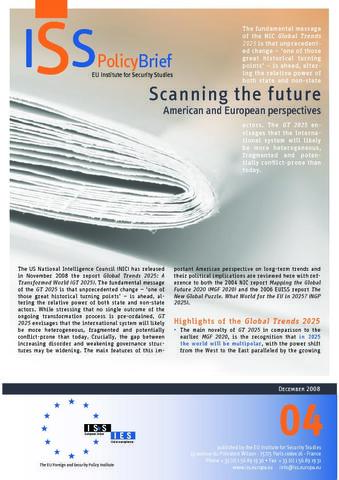You are here
Scanning the future: American and European perspectives

The US National Intelligence Council (NIC) has released in November 2008 the report Global Trends 2025: A Transformed World (GT 2025). The fundamental message of the GT 2025 is that unprecedented change – ‘one of those great historical turning points’ – is ahead, altering the relative power of both state and non-state actors. While stressing that no single outcome of the ongoing transformation process is pre-ordained, GT 2025 envisages that the international system will likely be more heterogeneous, fragmented and potentially conflict-prone than today. Crucially, the gap between increasing disorder and weakening governance structures may be widening. The main features of this important American perspective on long-term trends and their political implications are reviewed here with reference to both the 2004 NIC report Mapping the Global Future 2020 (MGF 2020) and the 2006 EUISS report The New Global Puzzle. What World for the EU in 2025? (NGP 2025). Highlights of the GT 2025 • The main novelty of GT 2025 in comparison to the earlier MGF 2020, is the recognition that in 2025 the world will be multipolar, with the power shift from the West to the East paralleled by the growing relevance of non-state actors. Three main consequences follow on from this basic finding. First, the US will remain by all standards the most powerful country in the world but will only be primus inter pares. Second, the US’s room for manoeuvre will be more constrained both militarily and economically and, therefore, politically. At the same time, however, more countries may need to rely upon the US as an external balancer in the face of the emergence of regional heavyweights or even new nuclear powers. Besides, the growing power of countries such as China, India and perhaps Russia will not necessarily result in their willingness to take on more responsibilities for dealing with common challenges such as terrorism or proliferation. This would in turn aggravate the envisaged global governance deficit. • The report stresses that the emerging international system will not only be multipolar but also more heterogeneous. This is not only due to the proliferation of non-state actors, whether agents or spoilers of globalisation, but also to the different features and priorities of major state actors. Rising powers benefit from a functioning international system but are unlikely to simply adopt Western norms and development models...